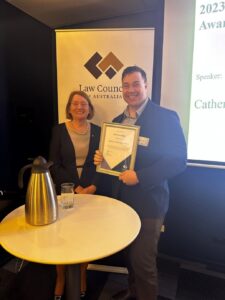Contents
1. Tell us what you think of the E-Flyer
2. New Financial Rights board members
3. Consumer advocacy recognition
4. Small Amount Credit Contract Reforms now in effect
5. Revised strata arrears information from the Australian Tax Office and NSW government
6. Top tips for people struggling to pay their mortgage
7. You can now donate function to Financial Rights via our website
1. Tell us what you think of the E-Flyer
How are we doing? Our quick 2 question survey asks how frequently you’d like to receive this E-Flyer and what you’d like to read about.
2. New Financial Rights Legal Centre board members
We are pleased to welcome 3 new members to the Board of Financial Rights – Mitali Tyagi, Beth Schwalbe and Peter Kell.
Mitali Tyagi
 Mitali advises governments across the Asia-Pacific on matters related to illicit financial flows, financial regulation and supervision of financial institutions. In this context, she has a deep interest in policy issues surrounding financial inclusion, de-risking, and robust, risk-based regulation of financial service providers. She specialises in international law and international frameworks governing trade, finance and investment. Mitali has experience in community legal centres, having worked with the Cape York Land Council and the Welfare Rights Centre.
Mitali advises governments across the Asia-Pacific on matters related to illicit financial flows, financial regulation and supervision of financial institutions. In this context, she has a deep interest in policy issues surrounding financial inclusion, de-risking, and robust, risk-based regulation of financial service providers. She specialises in international law and international frameworks governing trade, finance and investment. Mitali has experience in community legal centres, having worked with the Cape York Land Council and the Welfare Rights Centre.
Beth Schwalbe

Beth Schwalbe is a certified financial counsellor and Certified Practicing Accountant. She has worked in a wide variety of accounting roles in small and large companies, in Australia and the Netherlands. Over her career, she has become proficient at analysing and interpreting financial information for evaluation and decision making. Currently, Beth works as a financial counsellor. She provides support, information and advocacy for vulnerable clients, helping them to overcome crises and achieve long-term financial stability. She has also had great success giving presentations and running workshops on personal finances and other related topics. She believes strongly in the importance of representation and the value of systemic reform.

Peter Kell
Peter has extensive experience in consumer policy and advocacy, particularly in financial services. He is Managing Director of Promontory Australia. Peter is a former Deputy Chair of both the Australian Securities and Investments Commission and the Australian Competition and Consumer Commission. He was also Chief Executive Officer of CHOICE, the Australian Consumers’ Association. Peter is Chair of the ACCC’s Consumer Consultative Committee.
3. Consumer Advocacy Recognition

The Centre’s strategic campaigning work has been recognised in 2 recent awards.
In July, Mob Strong Debt Help senior solicitor and policy advocate Mark Holden received a Highly Commended Award at the Law Council of Australia’s Consumer Rights Awards. Mark is a Dunghutti man who has been a member of our First Nations-led Mob Strong Debt Help team since 2017. We nominated Mark for his work on behalf of hundreds of First Nations’ consumers affected by the collapse of the Aboriginal Community Benefit Fund (Youpla), and his outstanding contribution to the Save Sorry Business campaign (in addition to other areas of First Nations consumer protection).
Later that month, Stop the Debt Trap Alliance and the Save Sorry Business Coalition, were named joint winners of the Consumers’ Federation of Australia’s Showcase advocacy award. Financial Rights and Mob Strong played a key role in both these campaigns, which called for action to protect consumers from the harms of payday loans, and to support First Nations consumers impacted by the collapse of funeral insurer Youpla. Bettina Cooper, a Boandik woman and the Mob Strong Financial Counsellor and Strategy Lead accepted the award as the Save Sorry Business Coordinator. Getting justice for First Nations people impacted by the collapse of Youpla remains a priority for the Centre.
4. Small Amount Credit Contract reforms now in effect
Following Treasury’s review of small amount credit contract laws in 2016 and after a long period of consultation, changes have been made to the laws regulating small amount credit contracts and consumer leases.
The changes are effective from 12 June 2023 onwards and now form part of the National Consumer Credit Protection Act 2009 (Cth) (‘the Credit Act’). The reforms are intended to offer additional protections for consumers, particularly those who may be at risk of getting trapped in a debt spiral.
Small Amount Credit Contracts
Small amount credit contracts, also known as SACCs or pay day loans, are credit contracts that run for a term of between 13 days and 12 months, and provide up to $2000 credit.
Amendments
- Protected earnings amount: Payments under any SACC loans now cannot exceed 10% of the consumer’s income. The protected earnings amount previously only applied to consumers who received at least 50% of their income from Centrelink income support, whereas now it applies to all consumers regardless of their source of income. It is important to note that the income figure used should be the net amount or the after tax income, not the client’s gross or before tax income.
- Rebuttable presumption of unsuitability removed: Previously a SACC was presumed to be unsuitable if the consumer had been a debtor under 2 or more SACC loans in the previous 90 days or was already in default under another SACC. The presumption was removed as it appeared to be ineffective in protecting consumers, and the protected earnings amount is considered to be a more effective way of protecting vulnerable consumers regardless of their source of income.
- Warnings: Licensees must display and give information, determined by ASIC, to consumers about SACCs. Previously the required information was prescribed by the regulations.
New protections
- Equal payments: SACCs must now have equal repayments and repayment intervals over the life of the loan. Except, for example, the final payment which can be smaller than the preceding payments. This is aimed at preventing the practice of front loading, which is where a credit provider maximises their revenue and increases the cost of a product by extending the loan term.
- Fees: Providers cannot charge consumers for unexpired monthly fees if they repay the loan early. This also means that they can’t require the consumer to pay all the monthly fees up front.
- Anti-hawking: Providers cannot make unsolicited communications to consumers, either orally, in writing or by electronic means. Unsolicited communications are defined as communication where there has been no prior request by the consumer to the SACC provider. This applies to any consumer who is or has at any time been a debtor under a SACC, or has applied for a SACC from any SACC provider (whether successfully or unsuccessfully).
- Assessments: Providers must now document in writing their assessment that a loan was not unsuitable and the inquiries and verifications it made in relation to that assessment. ASIC will set the requirements of this provision.
- Referrals: SACC providers cannot refer consumers to unregulated credit providers. This means a SACC provider cannot make a referral if it’s reasonable to believe the consumer, either directly or indirectly, will enter into a contract under which credit is provided but is not subject to the National Credit Code.
Consumer Leases
A consumer lease is a contract for the hire of goods where the consumer does not have any right or obligation under the contract to purchase the leased items.
Amendments
- Assessment: Lessors must obtain and consider transaction information on lessees’ accounts for at least 90 days preceding the lease. They must also document in writing their assessment that the lease was not unsuitable and the inquiries and verifications they made in relation to the assessment. Previously, lessors were only required to take reasonable steps to verify a consumer’s financial situation.
- Price disclosure: Lessors are required to disclose the difference between base price of leased goods and the total amount payable. Previously, lessors only had to disclose the total amount of rent payable under the lease.
New protections
- Indefinite leases: Are now covered by the National Credit Code, whereas previously they were excluded from regulation.
- Protected earnings amount: This will apply in the same way as for SACCs, that is, no more than 10% of a lessee’s net income can go towards lease payments, regardless of their source of income.
- Anti-hawking: Similarly to SACCs, unsolicited communication is prohibited.
- Permitted Cap: There is now a cap on the total amount payable by a lessee, worked out using the formula below:
The permitted cap is the sum of:- the base price of the hired goods; plus
- the amount worked out by multiplying the base price of the goods hired under the consumer lease by:
- For consumer leases with a fixed term: 0.04 x number of whole months of the consumer lease (up to a maximum of 48 months); OR
- For consumer leases with an indefinite period: 1.92; plus
- Permitted delivery, installation and add on fees (if any).
- ASIC has the power to declare which installation and add-on fees will be permitted.
- Monthly cap: There is also a monthly cap on payments under indefinite leases, which is 1/48 of the permitted cap.
Anti-avoidance measures
The amendments also inserted an anti-avoidance provision, which prohibits the carrying out of a scheme for an avoidance purpose in relation to SACCs or consumer leases. This includes schemes that avoid being regulated as SACCs or consumer leases by the Credit Act altogether, as well as schemes that avoid the application of a particular provision of the Credit Act.
While there have been none formally reported on yet, an avoidance model may look like a lender upselling a consumer from a SACC to a Medium Amount Credit Contract (a loan between $2001-$5000) to avoid applying the 10% protected earnings amount. For consumer leases, an avoidant model may involve a consumer looking to borrow money, but instead being offered a consumer lease or alternatively a consumer looking to lease goods, but instead being sold a sale by instalments contract where the price of the goods have been inflated, to avoid the permitted cap applying.
What does this mean for consumers?
As these regulations are new, Financial Rights, along with other consumer groups and ASIC, will be looking closely at how they are applied by lenders and lessors. The amendments are intended to better protect consumers from unsuitable products and unscrupulously high fees, so notifying ASIC of any potential breaches of the laws is important.
It will be critical to look closely into the application process to determine whether the lender or lessor has properly considered the needs of the consumer and followed its responsible lending obligations in providing a product that is not unsuitable. If a SACC or consumer lease product seems unaffordable or otherwise not suitable for the consumer, it will be worthwhile obtaining the application documents and seeking legal advice if you are unsure whether new regulations have been followed correctly.
Tips for Financial Counsellors and Community Lawyers – what to ask your clients
- Find out when they got the loan or lease – this will tell us whether the new laws apply.
- Ask them how they found out about the lender or lessor – in particular were there any unsolicited communications?
- Ask them about their financial situation – in particular their income and whether they had any other leases or loans, so you can work out if the protected earnings amount was exceeded.
- Ask what the payments are under the loan or lease – that’s because payments are meant to be an equal amount with equal repayment intervals. You can also use this information to work out whether a lease complies with the monthly cap.
- Ask what information did the lender or lessor obtain prior to providing loan or lease – to establish whether they collected and considered the required 90 days of bank statements and other verifying documents.
- And ask what information were they given before getting the loan or lease – to establish whether the disclosure requirements were met.
- Ask for a copy of the assessment the lender or lessor carried out.
If you need guidance further guidance, caseworkers and clients may contact Financial Rights via:
- Credit and Debt Legal Advice Line 1800 844 949
5. Revised strata arrears information from the Australian Tax Office and NSW government
Financial Rights regularly helps clients who are being aggressively pursued for small amount strata arrears. Together with Financial Counselling Australia, we have been advocating to NSW Fair Trading for reforms to make financial hardship arrangements available to people in arrears with their strata levies.
While that advocacy work remains ongoing, the ATO and NSW Fair Trading have updated some of their public-facing information to provide clearer guidance on what to expect when recovery action is being taken on behalf of a strata scheme.
The Australian Tax Office’s superannuation pages now explain that early access to superannuation on compassionate grounds (to prevent foreclosure or the forced sale of property) is possible where there is:
- mortgage arrears
- outstanding council rates or
- a court order (to sell the home to satisfy an outstanding debt owed to another entity such as a body corporate / strata scheme).
The ‘court order’ ground is an important clarification from the ATO. Whilst this is an important step, Financial Rights experience has been that it has been difficult to obtain early access of superannuation for a specified compassionate ground to repay a bankruptcy notice or creditors petition for strata. We welcome any feedback from Financial Counsellors with any difficulties or successes.
The NSW government website has also updated its public information on strata levy matters. It now:
- encourages owners in financial hardship to contact their owners corporation or agent as soon as possible and to ask for a payment plan to be put in place
- provides details about contacting the National Debt Helpline, linking to their strata levies web page
- provides information about contacting Fair Trading for assistance (i.e. mediation) in the event of any disputes about unpaid levies, and
- clarifies that reasonable costs to recover unpaid levies (e.g. debt recovery costs) can only be recovered by the owners corporation by order of the Tribunal or court.
6. Top tips for people struggling to pay their mortgage
As more people roll off fixed mortgages, many households are finding it harder to make ends meet. A growing number of people are contacting Financial Rights for the first time as they struggle to keep up with rising cost of living.
What can people do if they are struggling to pay their mortgage? It’s a question we get asked to comment on frequently by media outlets, so here are our top tips.
- Call your lender early – Borrowers who are struggling – or who anticipate that they might soon be – should really get on the front-foot and engage with their lender. Calling a lender before falling behind on loan payments or other bills can provide access to more options.
- Ask for a better deal – Asking for a better deal on a loan is another strategy – sometimes speaking with customer retention teams can unlock extra savings.
- Don’t forget your other bills – Don’t assume a mortgage is the highest-priority household expense – repossessing a home in Australia is an onerous process and most banks don’t want to have to do it. They will seek ways to keep people in their home. A bank may consider options to reduce repayments — for example, moving to interest-only payments or extending the loan term. Missing other payments (like strata levies or council rates) may cause bigger problems for you in the short term.
- Negotiate your smaller debts – You can try to negotiate on smaller debts and payments. Interest free repayment arrangements on credit cards, or long term arrangements on energy bills, can often be negotiated. Credit providers and utilities have mandatory hardship programs for people who seek to enter them. Industry ombudsman schemes can also take complaints if an agreement about repayment arrangements can’t be reached.
- You have rights – Customers have a right to request hardship assistance from a lender. If the mortgage holder is in a temporary period of hardship (family breakdown, in between jobs, taking time off work to deal with an injury) lenders must consider a hardship request.
- Don’t dig yourself deeper – Avoid borrowing more money or seeking to use a debt management firm to ‘consolidate’ debts. Often these services can have significant fees and charges, and don’t improve the financial position of the borrower.
If the financial stress being endured is ‘the new normal’, and there is no way to increase income significantly, unfortunately it may be time to consider whether this mortgage is really affordable. This can be a tough consideration, and financial counsellors can assist people weighing up their debt options. Reach out via the National Debt Helpline – 1800 007 007.
7. You can now donate funds to Financial Rights via our website
Financial Rights is now able to take donations via our website. We have received donations from past clients wishing to support others to get legal assistance, and businesses to whom we have provided free policy or other expert advice. Donations support our work to assist people in financial stress.
Find out more about how we help our clients on our Support our work page.
Don’t forget to fill in our quick survey.

